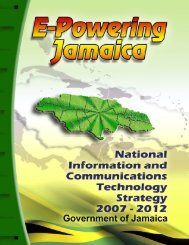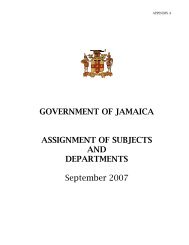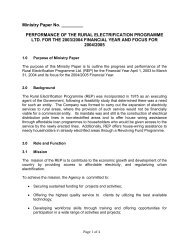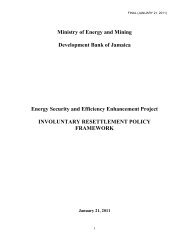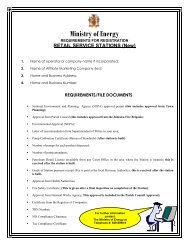3.2 Biodiesel IndustryThe transesterification process, which converts crude vegetable or recycled oil (and fats) tobiodiesel, is well established in Central America, Brazil, and the US. Several manufacturersdeliver turnkey operations that can be run by a small number <strong>of</strong> trained staff members. Thekey types <strong>of</strong> expertise in biodiesel production are chemical (or related) engineering andchemistry, as it involves chemical reactions at elevated temperatures (50-60 0 C), the use <strong>of</strong>chemical reagents (methanol and alkali), and phase separation. Personnel with properexperience can be recruited from other chemical operations in <strong>Jamaica</strong> and from the country’sresearch institutions. Training provided by the equipment manufacturer should suffice tostart, operate, and maintain a biodiesel production plant regardless <strong>of</strong> the feedstock used.3.3 Role <strong>of</strong> Research InstitutionsThe development <strong>of</strong> the appropriate workforce for the country’s ethanol industry should beserved by the country’s Universities and other research institutions, which <strong>of</strong>fer education,provide training, and conduct research. If necessary, <strong>Jamaica</strong>n institutions, such as the verycapable CERE, SRC, and SIRI, should be encouraged to collaborate with US, Brazilian, Colombianor other international institutions to bring to <strong>Jamaica</strong> knowledge and practices regardingbi<strong>of</strong>uels production. Regarding R&D, it is essential to support the ethanol and biodieselindustry, particularly in the area <strong>of</strong> agronomy and agriculture to develop plant varieties bestsuited for <strong>Jamaica</strong>’s weather and soil and to support the local farmers with best practices incultivation, maintenance, and harvesting <strong>of</strong> crops. Such programs in Brazil have resulted inphenomenal productivity improvements over the years, such as 33% increase in sugarcane yield(tons per hectare) 7 . Close collaboration with Brazilian and Colombian experts will also benefitthe industry with fermentation, distillation, and vinasse handling (ethanol) andtransesterification (biodiesel) improvements.The research institutions, as well as PetroJam, can support the ethanol and biodiesel industrieswith analytical method development, chemical analysis, and quality control issues as they arepossess appropriate expertise and instrumentation. Chemistry departments have the facultyexpertise and student availability to establish the necessary analytical protocols. The analysis<strong>of</strong> methylesters (biodiesel), in particular, requires a battery <strong>of</strong> tests to ensure that the finalproduct conforms to a certain standard that the industry will need to adopt. It could be theEuropean biodiesel standard EN14214 or the US standard ASTM D6751, and the Bureau <strong>of</strong>Standards <strong>of</strong> <strong>Jamaica</strong> is considering recommendations to stipulate the ASTM standard in thePetroleum Quality Control Regulations governing biodiesel blends up to B5. Regardless <strong>of</strong> thestandard adopted, a laboratory should be set up in <strong>Jamaica</strong> either at the biodiesel plant or at aUniversity or other research organization to address this critical need. Training for equipmentoperators should be sought from qualified personnel in countries such as the US or Brazil.7 Isaias de Carvalho Macedo, Sugarcane’s <strong>Energy</strong>, Unica, Sao Paulo, 2007.26
Finally, Universities can also provide support in the evaluation <strong>of</strong> cellulosic biomass conversionto ethanol using 2 nd generation technologies developed in the US and other countries. Athriving cane ethanol industry provides ideal conditions (co-location benefits) for thedeployment <strong>of</strong> bagasse-to-ethanol technologies with the prospect <strong>of</strong> significantly increasing theamount <strong>of</strong> ethanol produced per ton <strong>of</strong> sugarcane.As with sugarcane, R&D in plant agronomy and genetics will be valuable in identifying andimproving promising varieties <strong>of</strong> castor beans, jatropha, and other biodiesel feedstocks and insupporting <strong>Jamaica</strong>n farmers to ensure continuous and high-yield supplies <strong>of</strong> feedstocks.Because biodiesel production is not as energy intensive as cane ethanol, power co-generation isusually not practiced. However, given <strong>Jamaica</strong>’s future needs <strong>of</strong> additional power and the factthat biodiesel feedstocks generate considerable amounts <strong>of</strong> biomass, the feasibility <strong>of</strong> acentrally located power generation plant should be examined. If the logistics make sense, amore economical alternative could be to have biomass from biodiesel plants transported to acane ethanol facility equipped with cogeneration. There, such biomass can supplementbagasse for the production <strong>of</strong> energy and heat.27



